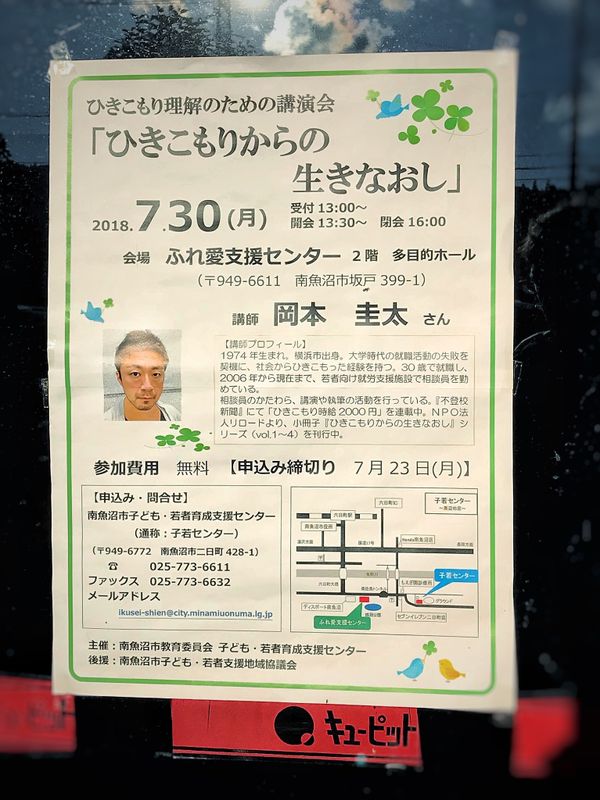Jul 25, 2018
Helping Hikikomori—a Worthwhile Effort
I was strolling along town and came across this poster here:

It’s an advertisement for a lecture on how to help people break free from the hikikomori lifestyle. I thought it is a worthwhile cause, and I’d like to take a second here to explain why.
Have you heard about hikikomori before? The term refers to shut-ins—folks who close themselves from the outside world and never leave their homes. The thing is, hikikomori aren’t agoraphobes (meaning they have extreme social anxiety), and they’re don’t necessarily have a history of abnormal antisocial behavior.
Rather, it’s a sad consequence of the structure of modern Japanese society. The fact that people are raised to believe that their whole life’s success is predicated on how well they test, the college they get into, and/or the company they are hired into creates a situation where some folks believe that if they do poorly on those tests, fail to get into the right school, or miss out on employment in their desired companies believe their life is essentially over—that there is no place for them in society. So they shut themselves away.
Now when I first saw the poster, I wondered, “Who is the seminar for if the shut-ins won’t leave the house to attend?” Well, the vast majority of hikikomori have somebody subsidizing their lifestyle—typically parents. The seminar is really for those folks, to give them tools and knowledge necessary for helping their loved ones break free of the hikikomori cycle.
I admire folks who help others, especially those who use their own trials and tribulations to assist folks going through similar troubles. I wish Okamoto-san all the best in his endeavors.
Do you know any hikikomori? Maybe a relative of a neighbor, friend, or acquaintance? My experience is somewhat limited, but the best thing you can do is offer friendly, consistent invitations to get out and do something together. Watch a movie. Get a coffee. Those types of things. With hikikomori, it’s about baby steps and acceptance from others in society, and funny enough, I’ve found as a gaijin you’re sometimes able to make inroads easier (perhaps because we’re “outsiders” in our own ways, too).
Hitting the books once again as a Ph.D. student in Niigata Prefecture. Although I've lived in Japan many years, life as a student in this country is a first.
Blessed Dad. Lucky Husband. Happy Gaijin (most of the time).



0 Comments